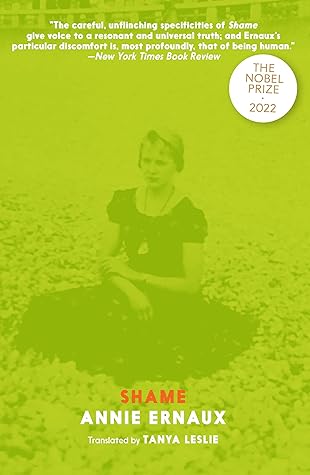More on this book
Community
Kindle Notes & Highlights
Before that, the days and dates inscribed on the blackboard and in my copybooks seemed just to drift by.
It may be that narrative, any kind of narrative, lends normality to people’s deeds, including the most dramatic ones. But because this scene has remained frozen inside me, an image empty of speech—except for the sentence I told my lovers—the words which I have used to describe it seem strange, almost incongruous. It has become a scene destined for other people.
The format and quality are too different to reveal any significant change in my face or figure but I like to think of them as two milestones: one shows me in my Communion dress, closing off my childhood days; the other one introduces the era when I shall never cease to feel ashamed.
It remains what it has always been since 1952—something akin to madness and death, to which I have never ceased to compare the other events in my life in order to assess their degree of painfulness, without finding anything that could measure up to it.
The general belief is that one cannot go anywhere that is not familiar, people feel genuine admiration for those who aren’t afraid of going places.
(I find it impossible to name this town, as I have done in previous books. Here it is not a geographical landmark on a map, lying somewhere between Rouen and Le Havre, cut across by the railroad tracks or highway N15. It is a nameless place of origin: as soon as I go back I succumb to a state of lethargy that prevents me from thinking or even remembering, as if the place were going to swallow me up once again.)
The neighborhoods lose in value the further one strays from the city center—fewer and fewer villas, more and more blocks of houses clustered around a shared courtyard. The more remote areas, with dirt tracks, potholes in rainy weather and farmhouses fronted by embankments, already belong to the country.
Sentences magically linking our body to the universe or to our destiny—there’s an eyelash on your cheek, you’d better make a wish; my left ear is popping, someone’s saying nice things about me—as well as to nature—my corn is hurting, it’s going to rain.
A lifetime is split up into successive stages when people become “old enough to”: —take Holy Communion and receive their first watch, have their hair permed in the case of girls, wear their first suit in the case of boys —start having their period and be allowed to wear stockings —drink wine at family gatherings, be allowed a cigarette, listen when grown-ups tell rude stories —get a job and go dancing, start “seeing” boys or girls —do one’s military service —go and see naughty films —get married and have kids —wear black —stop working —die.
In our lives nothing is thought, everything is done.
Yet they never stop talking about progress, seen as an inexorable driving force which cannot and must not be opposed, evidenced by more and more new products: plastic, nylon stockings, the ball-point pen, Vespa motorcycles, dried soup and free education for all.
At the age of twelve I was living by the rules and codes of this world; it never occurred to me that there might be others.
People were continually spying on each other. It was essential to learn about other people’s lives, so that they could be talked about, and co protect one’s own, so chat it couldn’t be.
Conversation classified people’s actions and behavior, slotting them into categories—good or bad, permissible, sometimes even encouraged, and inadmissible.
Illness was invariably tinged with guilt, as if people had somehow been neglectful with their lives.
Those who kept to themselves were looked down on and accused of boorishness. Wanting to live alone (contempt for bachelors and spinsters) and refusing to speak to others was seen as the denial of an act that carried human dignity: they live like savages! Besides, it clearly showed that one took no interest in what was undoubtedly the most interesting of all things—other people’s lives.
To be like everyone else was people’s universal ambition, the ultimate dream. Those who were different were thought to be eccentric or even deranged.
The words that come to me are opaque, stones too heavy to move.
The girls attending private school would immediately identify the other ones because of their clothes; sometimes they recognized items that had belonged to them, worn-out, relinquished garments that their parents had handed down to these needy girls.
(For me the word private will always suggest deprivation, fear and lack of openness. Including in the expression private life. Writing is something public.)
She worked desperately hard to achieve mediocre results.
Inventing dozens of addressees gives me intense satisfaction (something akin to sexual desire).
I had no place among the women’s bodies traveling on the bus; I was just a child growing up—tall, flat and healthy-looking.
I have just finished defecating far from the group, who are sitting at a roadside café. I realize that I have left part of myself in a place where I shall probably never come back.
I have always wanted to write the sort of book that I find it impossible to talk about afterward, the sort of book that makes it impossible for me to withstand the gaze of others. But what degree of shame could possibly be conveyed by the writing of a book which seeks to measure up to the events I experienced in my twelfth year.


